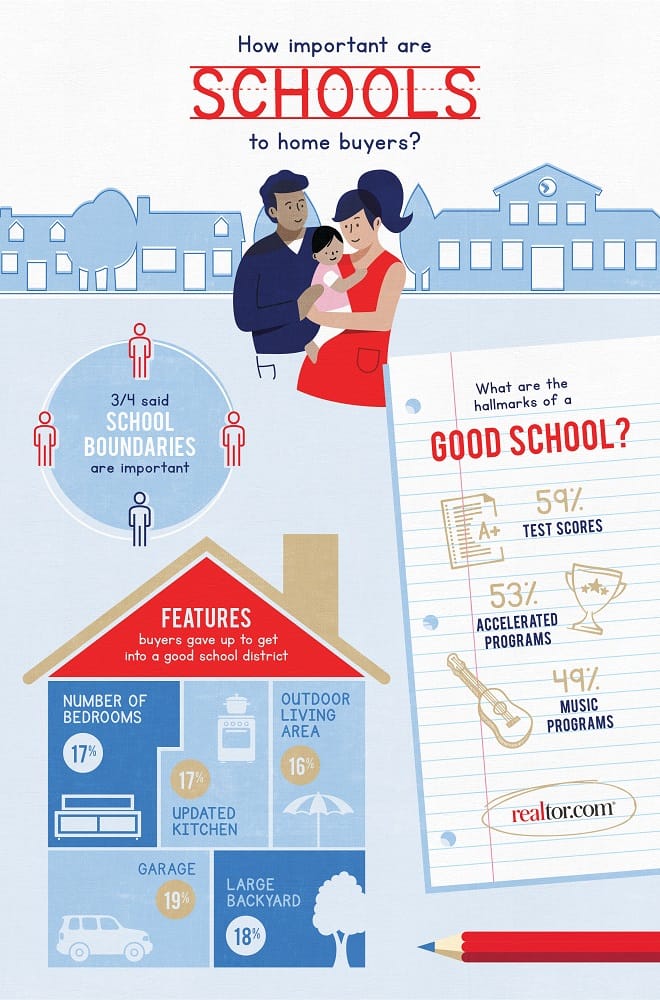– 78 percent of buyers gave up home features to get their school district of choice
– Most common compromises include a garage, large backyard, and updated kitchen
– Nearly three-quarters of respondents say good schools were important to their search
Santa Clara, CA – July 24, 2018 (PRNewswire) Today’s seller’s market is forcing buyers to make compromises, but new survey data from realtor.com®, The Home of Home Search℠, shows buyers remain steadfast in their desire for their preferred school districts. In fact, they are willing to give up two of their most desired home features — a garage and updated kitchen — to get into the school district they want.
“Most buyers understand that they may not be able to find a home that covers every single item on their wish list,” said Danielle Hale, chief economist for realtor.com®. “But our survey shows that school districts are an area where many buyers aren’t willing to compromise. For many buyers, ‘location, location, location,’ means ‘schools, schools, schools.'”
The online survey was conducted earlier this month by Harris Research of more than 1,000 people who closed on a home in 2018.
Three-quarters of respondents indicated schools were important in their search
The majority of successful buyers surveyed, 73 percent, indicated school boundaries were important to their search, with 39 percent indicating very important and 34 percent important. Only 18 percent said they were unimportant or very unimportant, and 9 percent of buyers were neutral on the question.
The desire for particular schools varied significantly by life stage and age. Ninety-one percent of buyers with children said that school boundaries were important or very important, compared to 34 percent of those without children. Similarly, younger buyers were more likely to say that schools were important. Eighty-four percent of those 35-54 years old and 86 percent of those 18-34 years old indicated they were important, compared to 37 percent of buyers 55-plus. More than half of older buyers 55-plus said school boundaries were unimportant or very unimportant.
Buyers compromise on their top home features for good schools
Seventy-eight percent of buyers for whom schools were important and who were able to get into their preferred district said they had to compromise on home features; 22 percent did not. The features they most commonly reported giving up were a garage (19 percent), a large backyard (18 percent), an updated kitchen (17 percent), desired number of bedrooms (17 percent), and an outdoor living area (16 percent). According to realtor.com’s spring home buyer survey a garage was the No. 1 feature home buyers were looking for this year, followed by an updated kitchen, and an open floor plan.
Older buyers were less likely to say they had to compromise with 42 percent of buyers 55-plus reporting they made no compromises, compared to 21 percent of 35-54 year-old buyers and 17 percent of buyers aged 18-34.

Back-To-School Infographic (PRNewsfoto/realtor.com)
Buyers define good schools by test scores and accelerated programs
Test scores were the factor most often selected by buyers as a hallmark of a good school (59 percent), followed by having accelerated programs (53 percent), arts and music (49 percent), diversity (43 percent), and before- and after-school programs (41 percent).
Younger buyers were more likely than older buyers to cite diversity as a factor that makes for a good school — 49 percent for 18-34 year-olds, compared to 37 percent for 55-plus. More older buyers placed importance on whether a school has accelerated programs — 62 percent for 55-plus vs. 50 percent for buyers under 55.
Buyers looking for homes in a specific district or school boundary, can search specifically within these parameters on realtor.com.® Buyers simply enter the name of a school or district into the search box on the realtor.com® home page. Homes within the area are then presented on a map with a “pin” showing the school name and location.
For more information about the survey, please visit: www.realtor.com.
About realtor.com®
Realtor.com®, The Home of Home SearchSM, offers the most comprehensive source of for-sale MLS-listed properties, among competing national sites, and access to information, tools and professional expertise to help people move confidently through every step of their home journey. It pioneered the world of digital real estate 20 years ago, and today is the trusted resource for home buyers, sellers and dreamers by making all things home simple, efficient and enjoyable. Realtor.com® is operated by News Corp [NASDAQ: NWS, NWSA] [ASX: NWS, NWSLV] subsidiary Move, Inc. under a perpetual license from the National Association of REALTORS®. For more information, visit realtor.com®.
Contact:
Lexie Holbert
lexie.puckett@move.com
Like this:
Like Loading...







